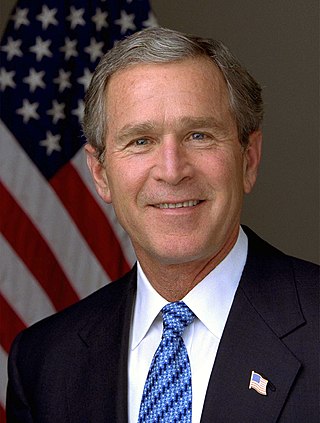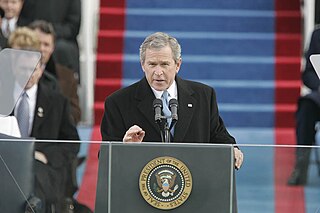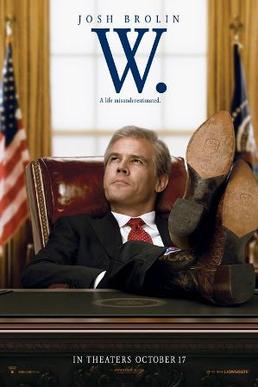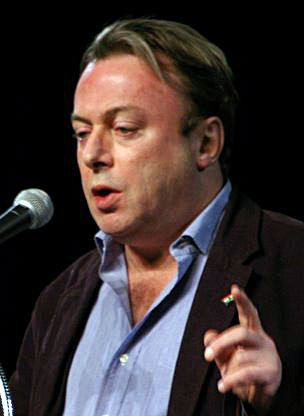
The Bush Doctrine refers to multiple interrelated foreign policy principles of the 43rd President of the United States, George W. Bush. These principles include unilateralism, preemptive war, and regime change.
A damaging quotation is a short utterance by a public figure used by opponents as a discrediting tactic. These utterances are often, but not always, taken out of context or otherwise changed to distort their original meaning. These quotations may be inserted or alluded to in negative political ads to discredit the character or intellectual ability of the originator. More typically, however, they are used in political arguments by both politicians and political pundits often in ways which are fallacious. These quotations are compiled into books or posted on the internet and are repeated in other contexts such as in talk radio or in the United States by stand-up comedians in late-night television monologues. The publication of these quotations is justified as a necessary part of maintaining an informed citizenry. In cases where the quotation in question is taken widely out of context it can be difficult for a candidate to find recourse, even though it is very easy to check the accuracy and the context of a quotation by using internet resources ; in popular jargon, the quotation can grow into a meme.

Condoleezza Rice is an American diplomat and political scientist who is the current director of the Hoover Institution at Stanford University. A member of the Republican Party, she previously served as the 66th United States secretary of state from 2005 to 2009 and as the 19th U.S. national security advisor from 2001 to 2005. Rice was the first female African-American secretary of state and the first woman to serve as national security advisor. Until the election of Barack Obama as president in 2008, Rice and her predecessor, Colin Powell, were the highest-ranking African Americans in the history of the federal executive branch. At the time of her appointment as Secretary of State, Rice was the highest-ranking woman in the history of the United States to be in the presidential line of succession.

Lawrence Ari Fleischer is an American media consultant and political aide who served as the 23rd White House Press Secretary, for President George W. Bush, from January 2001 to July 2003.
Compassionate conservatism is an American political philosophy that stresses using conservative techniques and concepts in order to improve the general welfare of society. The philosophy supports the implementation of policies designed to help the disadvantaged and alleviate poverty through the free market, envisaging a triangular relationship between government, charities and faith-based organizations. The term entered mainstream parlance between 2001 and 2009, during the administration of US President George W. Bush. He used the term often to describe his personal views and embody some parts of his administration's agenda and policy approach.

The 2004 Republican National Convention took place from August 30 to September 2, 2004, at Madison Square Garden in New York City, New York. The convention is one of a series of historic quadrennial meetings at which the Republican candidates for president and vice president, and party platform are formally adopted. Attendance included 2,509 delegates and 2,344 alternate delegates from the states, territories and the District of Columbia. The convention marked the formal end of the active primary election season. As of 2023, it is the most recent major-party nominating convention to be held in New York City.

Raw Spirit: In Search of the Perfect Dram is a nonfiction book by Iain Banks, first published in 2003. It is his only nonfiction book.
The 2004 documentary film Fahrenheit 9/11 generated controversy before, during, and after its release a few months prior to the 2004 U.S. presidential election. The film, directed by Michael Moore, criticizes the Bush administration's attempt to pursue Osama bin Laden in the aftermath of the September 11 attacks, as well as the Iraq War. Although Fahrenheit 9/11 was generally praised by film critics and won various awards including that year's Palme d'Or, the content was criticized by several commentators for accuracy, and lack of context. Additionally, the distributors protested Moore's inaction on unauthorized copying.
This bibliography of George W. Bush is a list of published works, both books and films, about George W. Bush, the 43rd president of the United States.

During the lead-up to the Iraq War, the United States had alleged that Iraq owned bioreactors, and other processing equipment to manufacture and process biological weapons that can be moved from location to location either by train or vehicle. Subsequent investigations failed to find any evidence of Iraq having access to a mobile weapons lab.

George Walker Bush is an American politician and businessman who served as the 43rd president of the United States from 2001 to 2009. A member of the Republican Party, he previously served as the 46th governor of Texas from 1995 to 2000.
A hot mic, sometimes referred to as an open microphone or a stuck mic, is in general an apparent error in which a microphone is switched on or remains on, especially without the speaker realizing.

Fictionalized portrayals of George W. Bush, the 43rd President of the United States, have become common since his inauguration on January 20, 2001. Many popular TV shows, magazines, books, and comics have portrayed or satirized him.

George W. Bush, the 43rd president of the United States, has elicited a variety of public perceptions regarding his policies, personality and performance as a head of state. In the United States and elsewhere, journalists, polling organizations and others have documented the expression of an evolving array of opinions of President Bush. Time magazine named George W. Bush as its Person of the Year for 2000 and 2004, citing him as the most influential person during these two years.

George H. W. Bush's tenure as the 41st president of the United States began with his inauguration on January 20, 1989, and ended on January 20, 1993. Bush, a Republican from Texas and the incumbent vice president for two terms under President Ronald Reagan, took office following his victory over Democratic nominee Michael Dukakis in the 1988 presidential election. His presidency ended following his defeat in the 1992 presidential election to Democrat Bill Clinton, after one term in office. Bush was the father of the 43rd president, George W. Bush.
The CNN/YouTube presidential debates were a series of televised debates sponsored by CNN and YouTube in which 2008 United States presidential election hopefuls fielded questions submitted through YouTube. The Democratic Party installment took place in Charleston, South Carolina and aired on July 23, 2007. The Republican Party installment took place in St. Petersburg, Florida and aired on November 28, 2007.

A Charge to Keep is a 1999 book written by then-Governor of Texas George W. Bush, with a foreword by Karen Hughes. Later editions have the sub-title My Journey To The White House.

W. is a 2008 American biographical comedy-drama film based on the life of George W. Bush. Directed by Oliver Stone and written by Stanley Weiser, it stars Josh Brolin as Bush. The supporting cast includes Elizabeth Banks, James Cromwell, Ellen Burstyn, Thandiwe Newton, Jeffrey Wright, Scott Glenn, and Richard Dreyfuss. Filming began on May 12, 2008, in Louisiana, and the film was released on October 17, 2008.

Christopher Hitchens was a British and American author, polemicist, debater and journalist who in his youth took part in demonstrations against the Vietnam War, joined organisations such as the International Socialists while at university and began to identify as a socialist. However, after 9/11 he no longer regarded himself as a socialist and his political thinking became largely dominated by the issue of defending civilization from terrorists and against the totalitarian regimes that protect them. Hitchens nonetheless continued to identify as a Marxist, endorsing the materialist conception of history, but believed that Karl Marx had underestimated the revolutionary nature of capitalism. He sympathized with libertarian ideals of limited state interference, but considered libertarianism not to be a viable system. In the 2000 U.S. presidential election, he supported the Green Party candidate Ralph Nader. After 9/11, Hitchens advocated the invasion of Iraq. In the 2004 election, he very slightly favored the incumbent Republican President George W. Bush or was neutral and in 2008 he favored the Democratic candidate Barack Obama over John McCain despite being critical of both of them.















